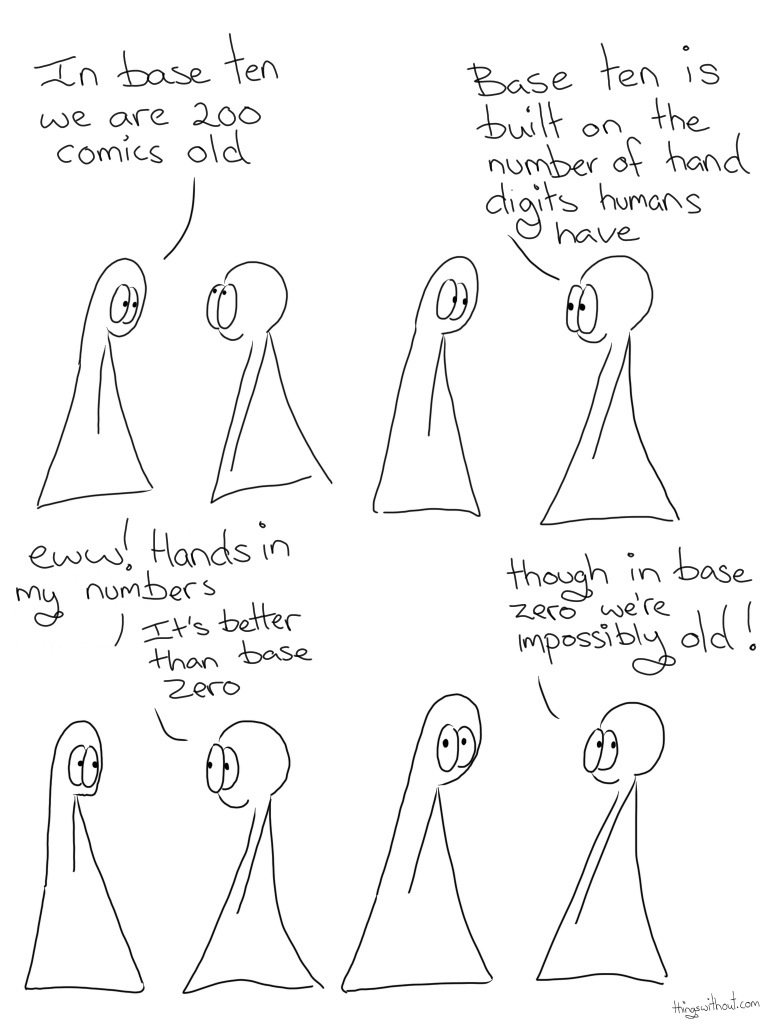Hooray! 200! Something to celebrate with cake!
Though this comic raises an interesting question in our big its, base ten focused world. If the Things came up with their own number system, without human influence, what base would they use and why?
Curious minds want to know, do you have a theory?
... While you answer that question I shall make the things some 200th comic cake.
Transcript
Thing 1: In base ten we are 200 comics old
Thing 2: Base ten is built on the number of hand digits humans have
Thing 1: Eww! Hands in my numbers
Thing 2: It's better than base zero.
Thing 2: Though in base zero we're impossibly old!


9 thoughts on “Numbers! (Comic #200)”
Mike
“That is not dead which can eternal lie
And with strange aeons even death may die”
Hmmmmmm
liz
Now I’m trying to wrap my brain around Non-Euclidean geometry! Oh my ears and whiskers it’s like reading a foreign language. I get the sense from this that Non-Euclidean geometry could be performed in any base. http://en.wikipedia.org/wiki/Non-Euclidean_geometry
Thomas
Binary, Each digit is on/off (or exists/does not exist, there/not there, etc) which is a concept any intelligent species can wrap their minds around.
liz
They is or they isn’t sounds very Things.
Andria Schwortz
I agree, base 2. If the creatures have no physical predilection towards one number system or another, it’s going to be base 2.
Michael Kurland
Non-Euclidean Geo is any Geometry that uses other postulates than Euclid’s. The one that usually goes is the parallel lines one. I don’t see why any geometry can’t be notated in any base.
liz
Which means we still don’t know what base the Things would develop for the mathematics if there wasn’t human interference.
Geoffrey A. Landis
Well, we use a digital number system. It’s possible that a non-human would use an analog system, for example, a squiggly line one unit long for one, two units long for two, twenty units long for twenty, one and a quarter units long for one and a quarter, etc.
This does make it hard to write very large numbers, but they could have the equivalent of a decimal place or an exponent.
If you’re sticking with digital representations, I like balanced ternary, which is a system that is logical, but humans just don’t use. Balanced ternary uses just three digits, zero, one, and negative one.
liz
Fascinating. I shall have to find out more about balanced ternary… this looks good. http://www.mortati.com/glusker/fowler/ternary.htm
Now I shall have to sit with it for a while as my brain slithers all over it!
Comments are closed.
Search by Character
Boot Bunson Hoppydew Cheetah Chuffles Dog Doodle Entity Elephant Eyes Flower Little Liz Maggie Mayara Meg Monorail Bunny Pumpkin Cat Rollerskate Sky Octopus Sock Spook Tankin Bear The ThingsPopular Comics
Saint Patricks Day (Comic #763)
Mar 17, 2024
The Return of the Worst! (Comic #765)
Aug 02, 2024
In Synch (Comic #756)
Dec 22, 2023
Equinox (Comic #766)
Sep 28, 2024
Biases (Comic #768)
Oct 22, 2024
Fancy! (Comic #738)
Dec 24, 2022
Nature aka Philosophy With a Small Yellow Cheetah (Comic #769)
Nov 08, 2024
Angles (Comic #758)
Feb 16, 2024
Familiarity, part 2! (Comic #770)
Nov 22, 2024
Grounding (Comic #764)
Jul 14, 2024